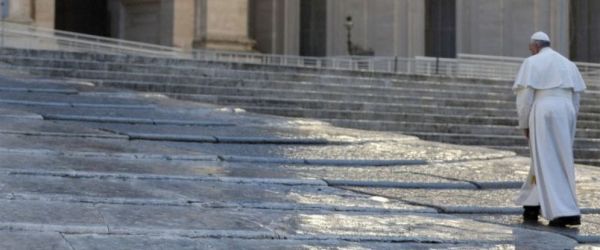Today, on the feast of the Holy Innocents, as the words of the angel to the shepherds still resound in our hearts – “I bring you good news of a great joy which will come to all the people; for to you is born this day in the city of David a Saviour” (Lk 2: 10-11) – I feel the need to write to you. We do well to listen to that proclamation again and again; to hear over and over again that God is present in the midst of our people. This certainty, which we renew each year, is the source of our joy and hope.
In these days we experience how the liturgy leads us to the heart of Christmas, into the Mystery which gradually draws us to the source of Christian joy.
As pastors, we are called to help foster this joy among the faithful. We are charged with protecting this joy. I ask you once again that we not let ourselves be robbed of this joy, for we can be disillusioned at times, not unreasonably, with the world around us, with the Church, or even with ourselves, and feel tempted to indulge in a certain melancholy, lacking in hope, which can lay hold of our hearts (cf. Evangelii Gaudium 83).
Christmas is also accompanied, whether we like it or not, by tears. The Evangelists did not disguise reality to make it more credible or attractive. They did not indulge in words that were comforting but unrelated to reality. For them, Christmas was not a flight to fantasy, a way of hiding from the challenges and injustices of their day. On the contrary, they relate the birth of the Son of God as an event fraught with tragedy and grief. Quoting the prophet Jeremiah, Matthew presents it in the bluntest of terms: “A voice is heard in Ramah, wailing and loud lamentation, Rachel weeping for her children” (2:18). It is the sobbing of mothers bewailing the death of their children in the face of Herod’s tyranny and unbridled thirst for power.
Today too, we hear this heart-rending cry of pain, which we neither desire nor are able to ignore or to silence. In our world – I write this with a heavy heart – we continue to hear the lamentation of so many mothers, of so many families, for the death of their children, their innocent children.
To contemplate the manger also means to contemplate this cry of pain, to open our eyes and ears to what is going on around us, and to let our hearts be attentive and open to the pain of our neighbours, especially where children are involved. It also means realizing that that sad chapter in history is still being written today. To contemplate the manger in isolation from the world around us would make Christmas into a lovely story that inspires warm feelings but robs us of the creative power of the Good News that the Incarnate Word wants to give us. The temptation is real.
Can we truly experience Christian joy if we turn our backs on these realities? Can Christian joy even exist if we ignore the cry of our brothers and sisters, the cry of the children?
Saint Joseph was the first to be charged with protecting the joy of salvation. Faced with the atrocious crimes that were taking place, Saint Joseph – the model of an obedient and loyal man – was capable of recognizing God’s voice and the mission entrusted to him by the Father. Because he was able to hear God’s voice, and was docile to his will, Joseph became more conscious of what was going on around him and was able to interpret these events realistically [...].
Christian joy does not arise on the fringes of reality, by ignoring it or acting as if it did not exist. Christian joy is born from a call – the same call that Saint Joseph received – to embrace and protect human life, especially that of the holy innocents of our own day. Christmas is a time that challenges us to protect life, to help it be born and grow. It is a time that challenges us as bishops to find new courage. The courage that generates processes capable of acknowledging the reality that many of our children are experiencing today, and working to ensure them the bare minimum needed so that their dignity as God’s children will not only be respected but, above all, defended.
Let us not allow them to be robbed of joy. Let us not allow ourselves to be robbed of joy, but guard it and nourish its growth.
May we do this with the paternal fidelity of Saint Joseph and guided by Mary, Mother of tender love, so that our own hearts may never grow hard.
[Pope Francis, Letter to Bishops 28 December 2016]












